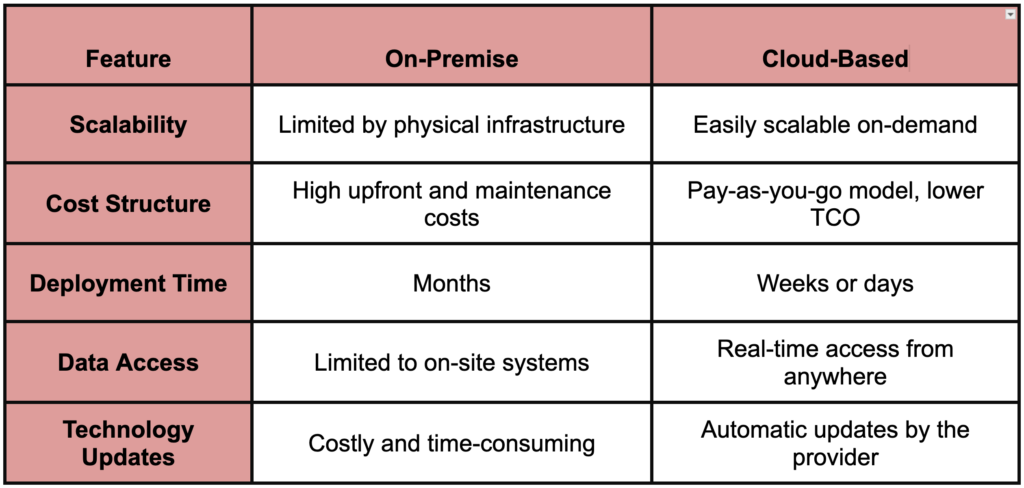The Role of Cloud-Based Solutions in Enhancing Contact Center Operations
Traditional contact centers are struggling to keep up with the ever-increasing customer expectations for seamless, omnichannel experiences. Customers demand fast, personalized service across multiple touchpoints, putting immense pressure on businesses to adapt.
This is where cloud-based contact center solutions come into play, offering a game-changing approach to customer engagement. Organizations can streamline operations, reduce costs, and deliver superior customer experiences by leveraging the power of the cloud.
Let’s explore how cloud technology is transforming the contact center industry and enabling businesses to stay ahead of the curve.
Key Benefits Driving Cloud Adoption
The global cloud contact center market is projected to grow at a staggering 21.3% CAGR from 2021 to 2030, reaching a valuation of $82.43 billion by 2030. This meteoric rise can be attributed to the numerous advantages cloud-based solutions offer:
Cost Savings and Operational Efficiency
Embracing cloud-based call centers can significantly reduce operational costs, providing a substantial competitive advantage. By eliminating the need for costly on-premises infrastructure and maintenance, businesses can realize substantial cost savings compared to traditional models.
Moreover, the scalability of cloud technology enables contact centers to swiftly adapt to fluctuating demand, scaling up or down within a matter of weeks. This agility, which typically takes months with on-premises systems, empowers organizations to optimize resource allocation and maintain operational efficiency without being burdened by rigid infrastructure constraints.
Enhanced Customer Satisfaction
The true testament to the power of cloud-based contact centers lies in their ability to elevate customer satisfaction. A significant majority of organizations report improved customer experiences after adopting cloud-based solutions.
This remarkable enhancement is driven by features that facilitate seamless, personalized interactions, which are integral components of cloud call center software. Real-time data access equips agents with comprehensive customer insights, enabling tailored support.
Seamless omnichannel contact center communication ensures consistent experiences across all touchpoints, while faster response times minimize frustrating wait periods. By prioritizing customer needs, cloud-based contact centers solidify brand loyalty and foster long-lasting relationships.
Seamless Integration with Multichannel Communications
Today, customers expect to engage with businesses through multiple channels, including phone, email, chat, and social media. A large portion of customers demand this omnichannel experience, and cloud-based contact centers deliver it seamlessly.
By integrating various communication channels into a unified platform through omnichannel software, these solutions ensure consistent and personalized interactions across all touchpoints. Customers can effortlessly transition between channels without repeating information, fostering a cohesive and satisfying experience.
Companies with a comprehensive range of channels receive significantly higher customer ratings compared to those with limited options, underscoring the importance of multichannel integration.
This seamless integration not only meets customer expectations but also enhances agent productivity by providing a centralized view of all customer interactions, thus reducing the risk of missed communications or duplicated efforts.
Leveraging Data and Analytics for Informed Decision-Making
Cloud-based contact centers, powered by omnichannel customer support software, excel in data management and analytics. They provide real-time access to customer insights and performance metrics across all communication channels. This data-driven approach empowers organizations to make informed decisions and optimize their operations.
With a substantial portion of cloud users leveraging AI-enabled capabilities, compared to a smaller fraction of on-premise users, the potential for actionable insights is magnified. These advanced analytics can identify patterns, predict customer behavior, and uncover areas for improvement.
From optimizing staffing levels to tailoring product offerings, these insights drive continuous enhancement and competitive advantage. A significant majority of organizations report improved decision-making and operational efficiency through cloud-based contact center analytics, solidifying their position in the market.
Robust Security and Compliance Measures
Despite the numerous advantages of cloud technology, concerns around data privacy and regulatory compliance often arise. However, cloud contact center providers prioritize security, with a vast majority offering encryption of customer data in transit and at rest.
This robust encryption ensures that sensitive information remains protected from unauthorized access, safeguarding both customer and business interests. Furthermore, these solutions enable compliance with regulations like GDPR and HIPAA, which govern data protection and privacy.
A significant majority of organizations cite improved compliance after migrating to cloud-based contact centers, demonstrating the industry’s commitment to upholding stringent standards. By adhering to these strict security and compliance measures, businesses can confidently leverage the power of cloud technology while mitigating risks and ensuring the integrity of their operations.
Enabling Remote Work and Global Teams
Another key advantage of cloud-based contact centers is their ability to facilitate remote work and distributed teams. With agents and support staff able to access the cloud-based platform from anywhere, businesses can tap into a global talent pool and ensure seamless operations even in the face of unexpected disruptions.
This flexibility not only improves employee satisfaction and retention but also enables organizations to provide 24/7 support across different time zones. By breaking down geographical barriers, cloud solutions empower businesses to deliver exceptional customer experiences round-the-clock, giving them a competitive edge in today’s always-on world.
Future Trends: AI, ML, and Omnichannel Integration
The future of cloud-based contact centers is brimming with exciting possibilities driven by emerging technologies. Artificial Intelligence (AI) and Machine Learning (ML) are expected to revolutionize customer interactions, with a substantial portion of all interactions predicted to be AI-driven in the coming years.
These advanced technologies will enable more personalized and efficient services, such as intelligent virtual assistants and predictive analytics, enhancing the overall customer experience. Additionally, the integration of omnichannel call center software with innovative solutions like chatbots and virtual assistants is projected to grow at a rapid pace, further enhancing the omnichannel experience.
Customers will enjoy seamless transitions between human and digital interactions, enabling businesses to provide round-the-clock support and tailored experiences. As these trends gain momentum, organizations that embrace cloud-based solutions will be well-positioned to capitalize on these advancements, staying ahead of the curve in customer engagement.
Conclusion
Cloud-based contact center solutions are revolutionizing customer engagement strategies. By harnessing the scalability, flexibility, and cost-effectiveness of the cloud, businesses can optimize operations, enhance customer satisfaction, and stay ahead of emerging trends. The future is cloud-powered, and those who embrace this technology will undoubtedly gain a competitive edge.
Frequently Asked Questions
- What are the primary cost benefits of using cloud-based solutions in contact centers?
Cloud-based contact centers significantly reduce the need for upfront hardware investments and lower maintenance costs, resulting in operational cost savings of up to 30%.
- How do cloud-based contact centers improve customer service?
With enhanced data accessibility, real-time communication capabilities, and seamless omnichannel integration, cloud solutions enable faster response times, personalized interactions, and consistent experiences across all touchpoints, ultimately delivering superior customer service.
- What security measures are in place for cloud-based contact centers?
Cloud service providers prioritize data security by implementing robust encryption protocols for customer data in transit and at rest. Additionally, they adhere to stringent compliance standards like GDPR and HIPAA, ensuring the protection of sensitive information.








